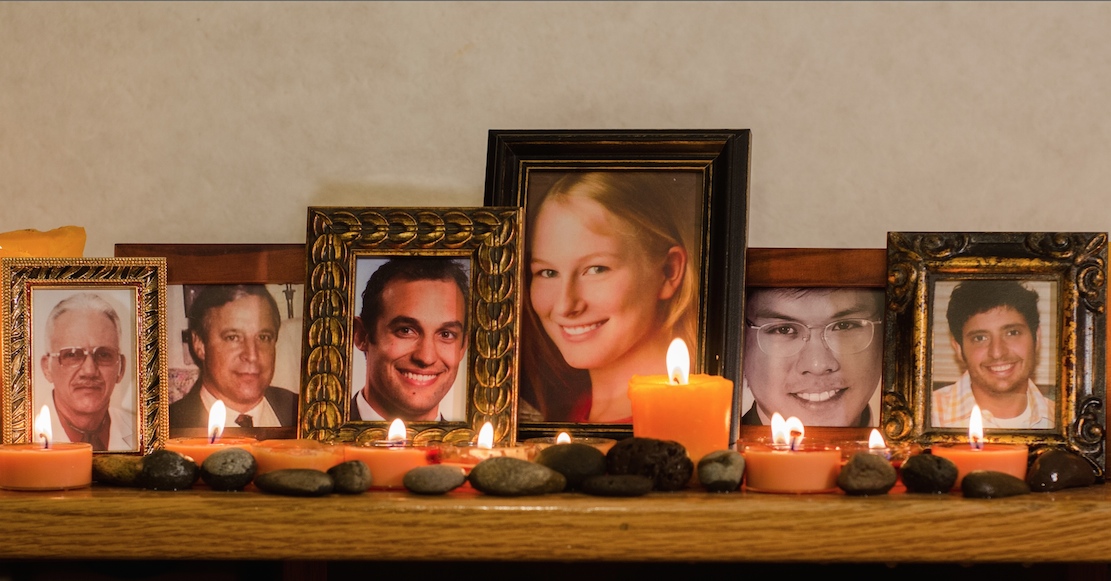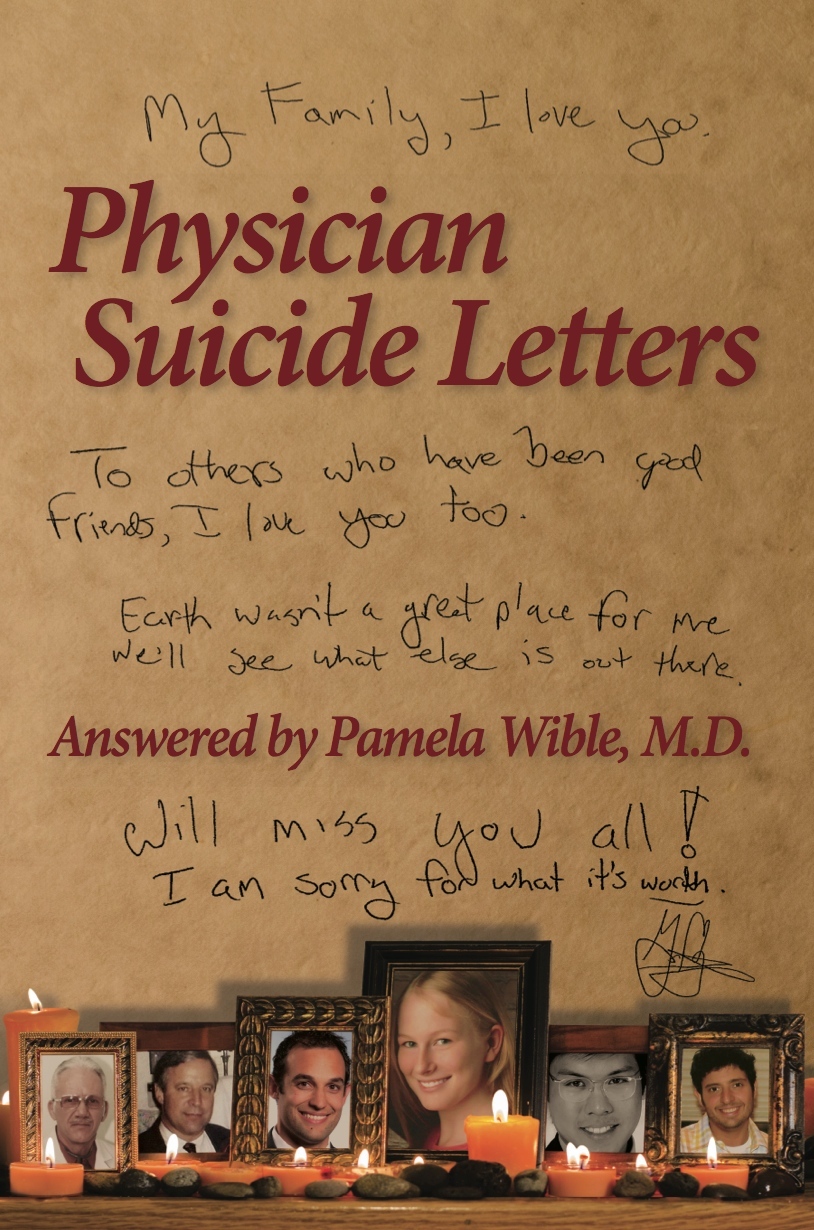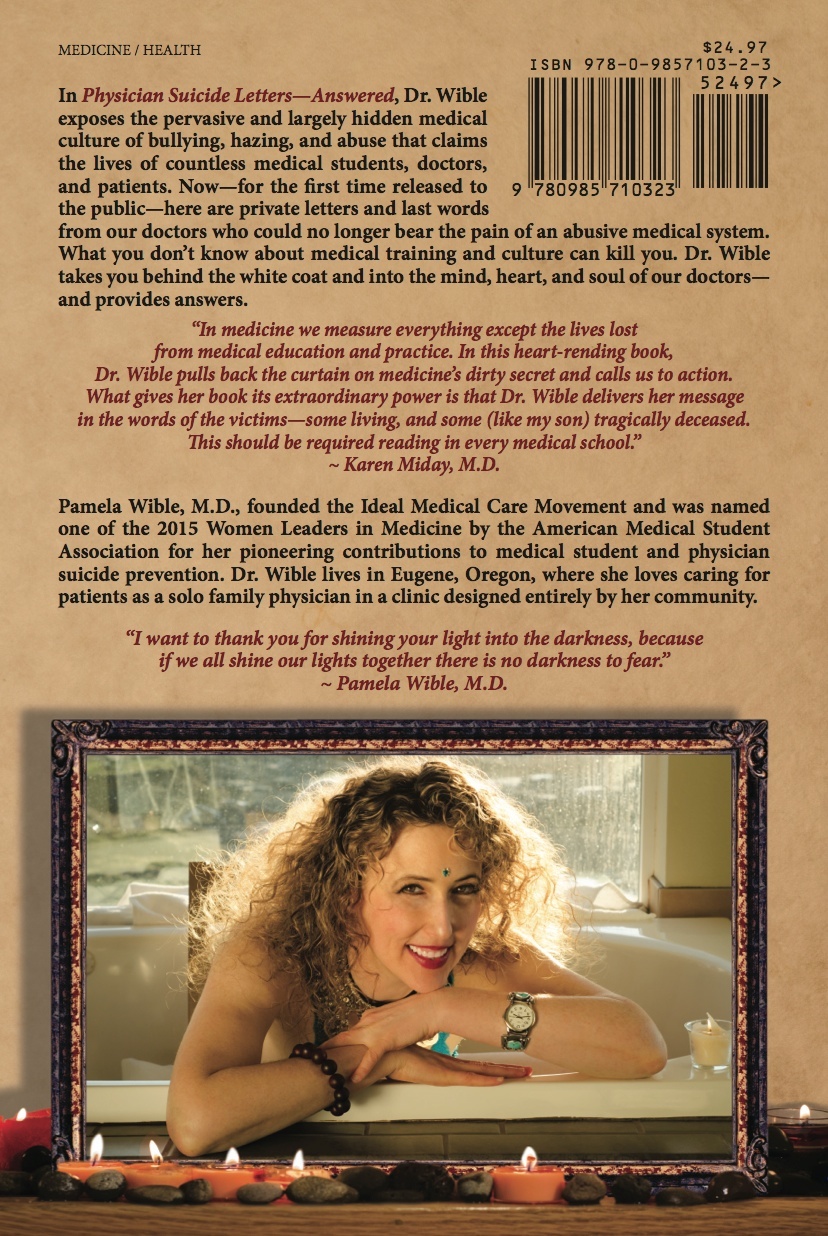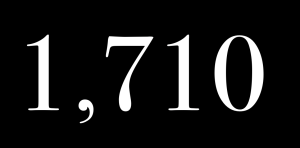
When is a taboo topic no longer taboo? When is it okay to stop hiding behind euphemisms? When is it safe to tell the truth? The answer is now.
This week I uploaded 53 chapters of physician suicide letters in a book that became a #1 Amazon bestseller in less than 24 hours. No publicity stunts. No PR team. No prelaunch marketing. How does a book become a bestseller in a day? When the public is ready for the truth.
Here’s a sneak peek inside:
December 3, 2015
Dear Dr. Wible,
I’m not sure you read your [Facebook] messages but feel compelled to thank you. I was finishing term two of med school and had a bottle of Xanax in my hand. I was ready, as so many of us are. I took three then three more and came across this link, “How to graduate medical school without killing yourself,” which I believe may have saved my life and a couple of close friends who are also suffering. I’m near the top of my class and praying for death to escape the trap I’m locked into. I was in true delirium from lack of sleep and fear of failure. Studying in my sleep and waking up every hour in panic. Med school is doable but why must it be taught in this format? I read your stories and I’m just in shock how many others feel like I do or I feel like they do. Please keep sharing. You are saving lives, friend.
Chris
I’ve been receiving letters like this for three years. Not all have happy endings. I also receive letters from families who have lost their brilliant, compassionate children—during medical school. And the suicides are not isolated to student doctors.
March 23, 2015
Pamela,
I am not surprised at the number of suicides among medical practitioners. I was a nurse for years and went back to school to be a physician assistant. There is so much abuse handed out in training. At the time I was in school, we still had some thirty-six hour shifts. It was difficult. At least at the university that I attended they had a buddy program. All of the first-year students were given a third-year student to help show us around and be a mentor. The problem was that before we even started our first classes, my mentor committed suicide. She was in her car on her way home still close to the hospital when she stopped at a red light then picked up a gun and shot herself in the head. The person behind her was a physician at the hospital. These things are not that unusual. It’s a sad state of affairs.
Patricia
These suicides are not isolated to students of medicine, to physicians, to physician assistants. The health care cycle of abuse impacts everyone in our hospitals, clinics, and medical schools. Including patients.
February 12, 2015
Pamela,
When I share what happens in our academic medical center with my non-medical friends, they are astonished and disbelieving. The level of bullying in my institution is amazing, including a faculty member seriously suggesting that a resident’s mistake was so heinous that he should “off ” himself. When I speak about changing the culture of medicine, my colleagues think it is impossible to support financially. In our institution, money is a deal breaker. We have a patient wellness program with financial/insurance premium incentives, but as far as I know, no physician wellness program with incentives. I will watch what happens with you with interest. Keep doing it.
Vicky
So what are the answers? How do we stop the cycle of institutional abuse? Physician suicide hotlines inside our hospitals? Resilience training for our wiped-out doctors? Meditation classes for medical students? Advocacy centers for mistreated patients?
February 13, 2015
Vicky,
It’s not costly or complicated to end bullying and hazing. It’s been outlawed at elementary schools, fraternities, and pretty much everywhere—except health care. How much does it really cost to be kind and compassionate? How much does it cost to replace hundreds of doctors who off themselves?
Pamela
Finally an answer.
In Physician Suicide Letters—Answered, Dr. Wible exposes the pervasive and largely hidden medical culture of bullying, hazing, and abuse that claims the lives of countless medical students, doctors, and patients. Now—for the first time released to the public—here are private letters and last words from our doctors who could no longer bear the pain of an abusive medical system. What you don’t know about medical training and culture can kill you. Dr. Wible takes you behind the white coat and into the mind, heart, and soul of our doctors—and provides answers.
This cycle of health care abuse is a global phenomenon. Letters in this book are from Canada, Egypt, India, South Africa, UK, and the USA. There is no country in which medical students are immune from the effects of a traumatic medical education. There is no perfect health system in which doctors do not struggle to preserve their humanity and patients do not die for lack of care. There is no amount of money, no high-priced health plan that will guarantee that the doctor controlling your ventilator is not sleep-deprived or suicidal. We are all at risk.
The solutions are simple.
The time to act is now.


Pamela Wible, M.D., is a family physician in Oregon. She is author of Physician Suicide Letters—Answered and Pet Goats & Pap Smears.













Compelling arguments for overhauling a barbaric system of education.
Kudos to you Dr. Wible for paving the way. Certainly there are medical professionals now passed who are cheering you on from the other side.
Keep up the great work dear friend. We need this.
With great gratitude for your presence here among us, and love,
Bodhi
When what should be a VOCATION is willfully transformed into a PROFESSION by the capitalist system which it is mangled to fit into, and where the priority becomes PROFITS rather than healing, and the veneration that used to be the doctor’s drains away…..why should doctor suicide come as a surprise?
The thing is even if there was a system in place like crisis it doesnt always work, sometimes the reason the person killing themself is physical (in patients mostly) its pretty sad people have to put up with any kind of crap like that in medical school, thats why doctors are unable to or just dont care about their patients atleast in my town. Ive wanted to die 1000 times over because of my health problems and ive been offered no solutions. The solutions i KNOW work are not available to me because if the drug has the side effect of euphoria its evil. I could careless about that opiates help my nerve pain, my muscle pain, my full body pain but because of our government bullying doctors they are afraid to prescribe.
Our entire medical system, drug system all need overhauled completely. Doctors are human and cant work 36 hour shifts
Nick, keep looking for kind, practical providers who are unafraid to prescribe what THEY and their patients believe is HELPFUL. I’ve never felt intimidated by government oversight; I’m not a Dr. Feelgood, but have always had a % of “good” patients who did well on long term “euphorics”.
I am outraged to be unable to prescribe what I want due to Parma and insurance setting the rules- like no Lyrica for fibromyalgia only post heretic neuralgia…
WTF! I should decide what to prescribe, not via versa. (Things like this kill pts AND providers)
I’ve been in the game over 30 years and seen the scales flip on pain tx- first cracking down in 1980, then Making pain tx a priority “the 5th vital sign”…when the sad face charts appeared. Now owing to overdoses, diversion, lack of addition tx (NP’S and PA’S cannot Rx suboxone, only percocet and vicodin) methodone is a disgusting tx.
Keep looking, be honest, do try “non euphoric” txs if you can affordability them-accupuncture, chiropractic naturopath MEDITATION yoga etc. A day at a time. Fear of endless pain is often worse than pain in the moment.
Ginger and I enjoy going to Pizza Hut for their luncheon buffet. Today rather than tuning their big screen tv’s to a sporting event they were on the children’s cartoon channel. They were showing Tom & Jerry and Tweety and Syvester cartoons. It’s obvious where bullying comes from. We see it as a funny chronicle of what in actuality is a horrendous reality later carried out by those who can’t differentiate fact from fiction. Unfortunately, all aspects of what may lead to suicidal tendencies are not addressed. This book will get the discussion started and hopefully open minded investigation will educate those who are seeking a profession where suicide should be listed as a side effect of this course of study much like prescription warnings. At least there is a simple solution and your crusade is a step towards heading in the right direction!
We so often have a culture of cruelty.
LOVE this black box warning on med schools and on applications.
WARNING: Suicide risk increases with a medical education.
Thank you, Pam. Am taking more care of me this year. Had a widowmaker w/o any risk factors or other arteries affected. WORK STRESS.
Was let go for no apparent reason 8 mos ago (5 mos after the MI)….looked for work always got interviews (from frying pan to fire) just couldn’t believe there is a place for me, no backing to start small private…declared bankruptcy 2 mos ago.
And I’m. Ok. And have some promising. . . options coming in. Too bad if I have to take the same salary i had in 2002, with less than half the health ins or PTO.
I need to work, to live, and to flourish. Questions Sera sera.
I am a priavte practice physician/surgeon and have definitely considered and even planned methods to be DONE with all of this, so this title did not suprise me!
All that hardwork for pretty much nothing. Gave up most of my young life to get the best possible training to do something that would help others and keep me interested/satisfied for a life time. But that goal/profession/calling has slowly (now accelerated) eroded away. I attempt to educate those that complain that I am a ‘rich Dr.’. They clearly don’t have an understanding of the situation.
School and training was not so bad (the horrendous debt was! 14 yrs of 2k/month payments back in the early 90s) but what is going on now is tragic – we have been pulled away from what renews us, the care of patients – our time with them, listening, educating, monitoring – our main goal and function (and our worth as physicians)has been replaced with useless paperwork.
We are being financially squeezed from every direction – decreased reimbursement and every bit argued, delayed, attempted recoveries years later, as well as increased costs -everything from expensive equipment [digital x-ray, EHRs, etc.] or fees from medicare, having to print our own EOBs or increased malpratice, increased costs of ‘administrative’ (new rules, coding and guidelines) education/books/software, my personal health coverage has gone to pot with Obama care (way higher deductibles and premiums, preventive care not covered); my stress has sky rocketed, health deteriorated, minimal free or family time.
It also feels like we are being treated like criminals – medicare audits, chart audits, peer reviews, pricey and repetitive testing for coding, board certification, industrial rules and guidelines, etc. – its constantly something.
We can no longer individualize treatment for a given patient as guidelines make all the decisions.
I spend hours at work doing unnecessary paperwork to get treatments authorized, work notes, disability paperwork, parking passes, PE notes etc – All that we are expected to do but None for which we get paid.
Then throw in the critism and competition (vs a team environment)of other physicians. There is no room for error or difference of opinion – mistakes and or bad incomes are unacceptable by patients, hospital admin or colleagues and most importanly – ourselves.
If I can leave medicine, I will. And I recommend to young/new people that it is not worth the time or financial investment – too risky, better more stable productive occupations. With the lower reimbursements, I don’t know how they would ever pay off the loans.
They are so worried about the Dr. shortage that is supposedly upcoming but they are doing NOTHING to address any of these issues. It likely will be too late for me as I will either go into another profession (1st degree is engineering), and retire when I can. With the hours I put in, I might even make more money at a minimum wage job but tons less stress and I could have some free time. Thanks for bringing attention to the issues.
OMG. Yes. Horrible. And there is a way out. It is not suicide. https://www.idealmedicalcare.org/blog/how-to-be-a-happy-doctor-in-less-than-2-minutes/
you have forgotten nurses
you have forgotten nurses. Not only have you forgotten nurses, but this website will not allow me to publish this comment.
Have not forgotten nurses. I mention others in the book. This health care cycle of abuse impacts us all. (I could no approve your comment because I was off the Internet for 4 days).
The first time I came across one of Dr Pamela’s speeches was in TedMed and I was amazed at knowing I wasn’t the only one suffering from the pressure, now that it’s a book I feel like I’ll always have the same comfort I had during that speech as I realized it wasn’t just me. This book is like a hug from someone who understands everything you might have went through as a medical student or practicing physician, it’s also something I wish my family & friends would read to have an idea about how hard it is at times.
Overall, I truly wish every medical student would read this, it’d be a great help during their journey.
Why so many suicides? Is it because it breaks their hearts when they discover “Big Pharma” controls it all. They teach the doctors to keep people sick. To kill and NOT to save or cure humans. Wonder how long it takes to not care or want to help others? How long till they can sleep at night or even “live” in their own skin?
Chapter 8 Maureen
Pamela,
As a physician who spent a year in residency avoiding walking next to busy streets, parking on the bottom of the garage, and refusing to have any medications in my house because I knew that I could, at any moment, use them as a means to escape, I thank you for your articles.
I recognize that it’s hard for many non-physicians to “feel bad” for doctors—we are seen as privileged. Many of us are egotistical. All of us are fallible. And, like everyone else, all of us are capable of plummeting to the depths of hell quickly and of feeling like there is no escape.
What I don’t think many non-physicians understand is some of the unique circumstances we face. Even other non-physician medical providers don’t typically have the same experience.
Most of us have to work our hardest to be at the top in high school and to get into a good college, then in college to do well on the MCAT and get into a good medical school. Then in medical school to do well on shelf and board exams to get into the residency we want. Even then, there’s no guarantee of that residency. We could work very hard for four years towards one specific goal and then be required to pursue a different specialty.
Once we’re in residency, what feels like indentured servitude begins. We can’t really choose where we go. We can list the places we’d be willing to go, and a computer decides for us. We can’t negotiate our contracts. We are frequently seen and treated by patients, other medical personnel, and (worst) our attending [supervising] physicians as unwelcomed intruders. Attending physicians who feel that it’s their right to treat residents like scum exist, and if you are unlucky enough to have one choose you as his/her pet destruction project, you have just bought into three to seven years of abject torture from someone who can literally end your entire career in a moment.
After residency, physicians work hard for their patients. We bring them home with us, figuratively speaking, every night. We work endless hours and sacrifice our families to help someone else’s family member. Sometimes we’re rewarded with the knowledge that we did our very best for someone, sometimes we find people who are grateful for our help. All too often, and more frequently these days, we find people who declare us slaves to pharmaceutical companies or the government. They declare that they know more than any doctor because they’ve read something on the Internet. They rant on about how doctors only want to make money and don’t care about patients, and they respond to articles about the problem of physician suicide with comments like “I don’t feel sorry for doctors at all.”
This doctor is working hard to pay off student debt that amounts to a very nice house. I really do love my patients and I do my best for them. I feel better most days, but I would never recommend medical school to another human being because one simply never comes out the same. Your writing helps us realize we’re not alone, even if non-physician members of society are likely to think we get what we deserve.
Maureen